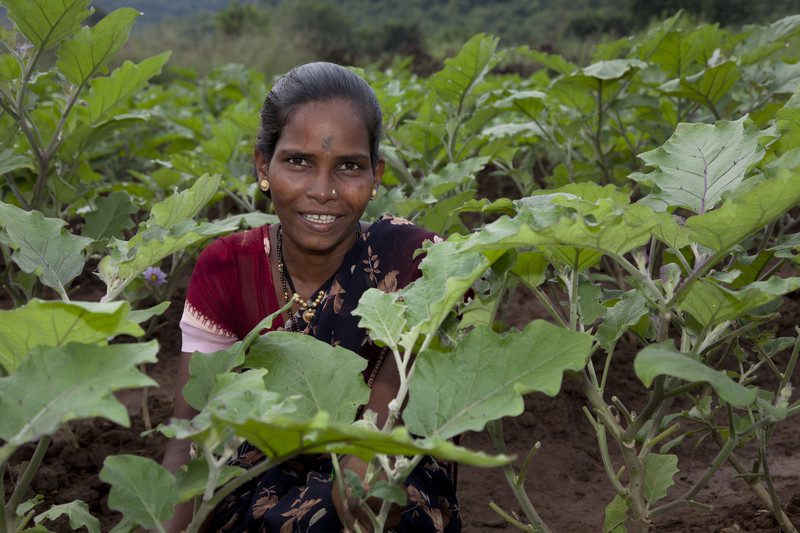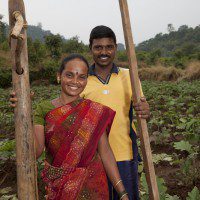
Ganesh (28), Anusaya (26) and their children live in the Katkari hamlet of Tadmal, south of Mumbai. Since receiving agricultural support from Oxfam partner SAKAV, they have been able to stop labouring on other people’s farms and concentrate on cultivating their own crops. Oxfam’s Chris Johnson met the couple on a recent trip to Maharashtra.
Can you describe what your life used to be like, and how it’s changed?
Ganesh: Both of us used to live with my parents previously. And like my parents, I also used to work as agricultural labourer in nearby villages … I used to earn about 70─80 rupees (AUD $1.45─1.65) per day. Slowly I learnt cultivation techniques from my parents, then we separated from our parents and took a land on lease in other village nearby here and then we started cultivating … Since we have started cultivating this land, now we are financially better placed and we are able to save some money. So our life is much more comfortable than 8─10 years back.
How did Oxfam and SAKAV help you learn about cultivating land?
Ganesh: So SAKAV and Oxfam has given us information on how to cultivate the lands. They have given us training in the training centre, they have given us the seeds. They have given us the water pumps. So this has helped us to grow lands … The main thing is that they have made us cultivate. Otherwise, we were just labourers.
How many children do you have?
Ganesh: Three. My eldest son is in school, and the two younger children — one daughter and one youngest son — they are still in kindergarten in nearby village.

Can you describe an average day for me, and maybe some of the challenges you face during the year?
Ganesh: Usually, since we have started cultivating the lands, our day starts in the morning. And first, after the morning’s activities, we go to our farm, see what is required … we do the water, and then if any problems we work on that problem. If there is not much to be done in … our land, then we will go around in the forest where we will collect the dry wood. We will sell that dry wood at a nearby village, earn some money, have a final look at our farm in the evening and then go back to home. That’s the life both of us have.
The biggest challenge that we used to face previously was the lack of resources. We could not do much … because we did not have resources, we did not have information … But now we are better placed. Sometimes we have problems of cash or money, but now because of our parents we are able to meet each other’s needs. There are [none of the] major challenges, as such, which we used to have eight or ten years back.
So how do you feel about your future?
Ganesh: The future plans that I see are that I want to buy some land where I can grow vegetables … I want to educate my children. And slowly I want to make my entire family feel comfortable, to bring them out of the exploitation all along that we have faced in the past.
You can help other indigenous families in rural India grow a future they can look forward to by donating to our Harvest Appeal.
It all begins with land: find out more about Oxfam’s work in India.